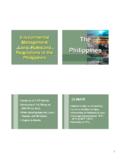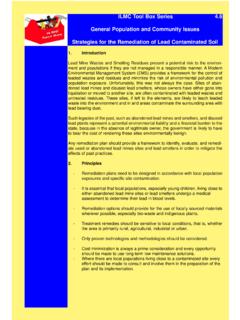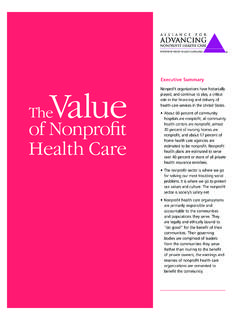Transcription of Introduction to the RAMCAR Corporation. The …
1 Introduction to the RAMCAR corporation . The RAMCAR Group of Companies is a Filipino owned corporation with a diverse range of business interests. The group is engaged in battery manufacturing, lead processing, plastic injection, tire re-treading, real estate development, and fast food chain operations. The two main subsidiaries involved in the Lead Industry are the Oriental and Motolite corporation , manufacturing lead acid batteries, and Philippine Recyclers Inc., a secondary lead plant recycling used lead acid batteries. The Motolite story began when Casto C. Unson started importing and selling batteries in the Philippines.
2 Together with two Filipino partners Casto C. Unson, then set up the Unson Company, Inc. and imported batteries from States Battery Parts of Seattle, Washington. After a few years, the partners decided to assemble the batteries themselves due to the ever growing demand for automotive batteries. In May 1950, the first Motolite battery rolled out of the assembly plant. Now, The ISO-certified manufacturing plant in Sta. Maria, Bulacan is the largest and most modern battery manufacturing facility in Southeast Asia. This 18-hectare facility is dedicated to the production of maintenance-free batteries, utilizing the latest expanded grid technology.
3 The plant also produces top quality automotive batteries for the US and Australian markets. In 1997, Unson corporation merged with RAMCAR , Inc., a company founded by Ramon Caro in 1917. RAMCAR , Inc. and at the time of the merger was the manufacturer of the Oriental Battery, Motolite's main competitor in the domestic market. The union produced the Oriental and Motolite corporation (OMC). The Oriental and Motolite corporation (OMC) is now the largest manufacturer, exporter and distributor of automotive, industrial, valve-regulated, and motorcycle battery products in the Philippines.
4 OMC is the industry leader in productivity, capacity and the utilization of modern battery technology. The company operates two modern and fully integrated manufacturing facilities that have sufficient capacity to meet the battery requirements of domestic consumption and provide for a healthy export market. Indeed, the company exports more batteries than are sold on the domestic market and Motolite batteries are found in the United States, Australia, Russia, and in most Asian countries. Philippine Recylcers Inc. (PRI) is located at Bulacan, approximately 10 kilometers north of the capital of the Philippines, Manila.
5 RAMCAR was founded in 1919 by Don Ramon Caro as an automotive electrical shop in Manila. As the business became more successful RAMCAR quickly expanded into automotive battery manufacturing and has now been producing batteries for over 80 years. In 1978, RAMCAR pioneered the manufacture of polypropylene casings to become the first company in the country to produce automotive batteries encased in plastic. The Company s dependence on imported primary lead finally ended in 1991 as Lead Smelters Inc (LSI), now Philippine Recyclers Inc, bought out First Metal Specialists Inc (FMSI) and took over their battery recycling operations.
6 Following a successful technology deal with the GNB corporation of the United States of America, the Company was able to refine secondary lead to a purity of %. From its original site at Gen. Luis St, Novaliches, Quezon City, LSI moved to Meycauayan, Bulacan and in 1981, it was registered with the Board of Investments (BOI) as a pioneer industry. The initial annual operating capacity of the Bulacan plant was 7,200 tonnes of lead production, but by 1989 production had risen to 12,000 tonnes, the maximum capacity of the Meycauayan plant.
7 By then LSI had become PRI and in order to meet the increasing demand for lead the Company relocated the secondary operation to its existing location at Bo. Patubig, Marilao, Bulacan. In July 1990, the Marilao plant was commissioned and became the Philippine s largest secondary lead smelter producing 36,000 tons of soft lead bullion and hard lead alloys from its reverberatory and blast furnaces respectively. In April 1995, PRI commissioned an automated mechanical battery breaker (an MA-41) that crushed and segregated the separate components of the automotive batteries.
8 The MA41 also included a desulfurization process to minimize the sulfur content of the furnace feed material and thereby improve the plant s environmental performance. In November of 1995, RAMCAR launched a nationwide initiative to stimulate the environment consciousness of the Filipinos. This campaign, known as the "Balik Baterya", encouraged the public to return their used automotive batteries to the RAMCAR retail network for recycling instead of dumping the batteries into domestic and industrial waste sites. In 1997 the Board of PRI and RAMCAR committed the company to the implementation of an environmental management system based on the securing ISO 14001 Certification.
9 Although the company already had a formal quality management system and had most of the components to meet the standard in place, much work was required especially in the planning stages. The company commissioned several specialist teams to work on the project, but in total almost half of the PRI employees were directly involved in the project. An estimated 36,000 man-hours were spent on group meetings and another 9,900 man-hours on training. PRI's certification was achieved because of the evident commitment of all its employees to develop means of reducing the company's environmental impact.
10 The certificate was awarded on November 12, 1999 by Soci t Generale de Surveillance - International Certification Services - at a ceremony at the PRI site in Bulacan. Philippine Recyclers Inc. was the first heavy industry in the Republic to be certified to ISO 14001 and is still the only battery recycling plant in Asia to be certified to ISO 14001. The RAMCAR Group are keen to support and promote community based environmental and health campaigns and have linked up with the largest media group in the Philippines, the ABS-CNB corporation and work with the ABS-CBN Foundation in pursuit of the Bantay Baterya Project.









